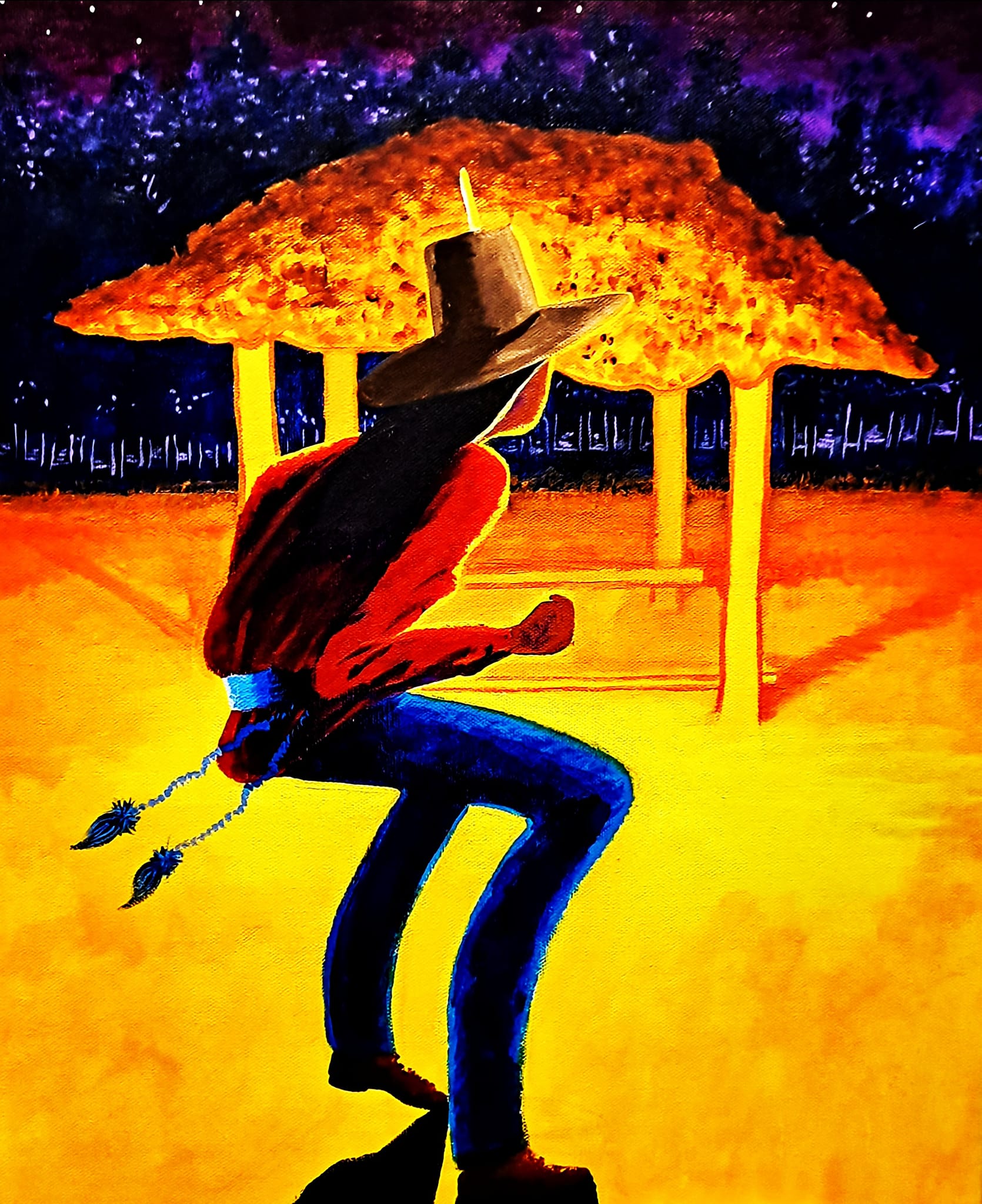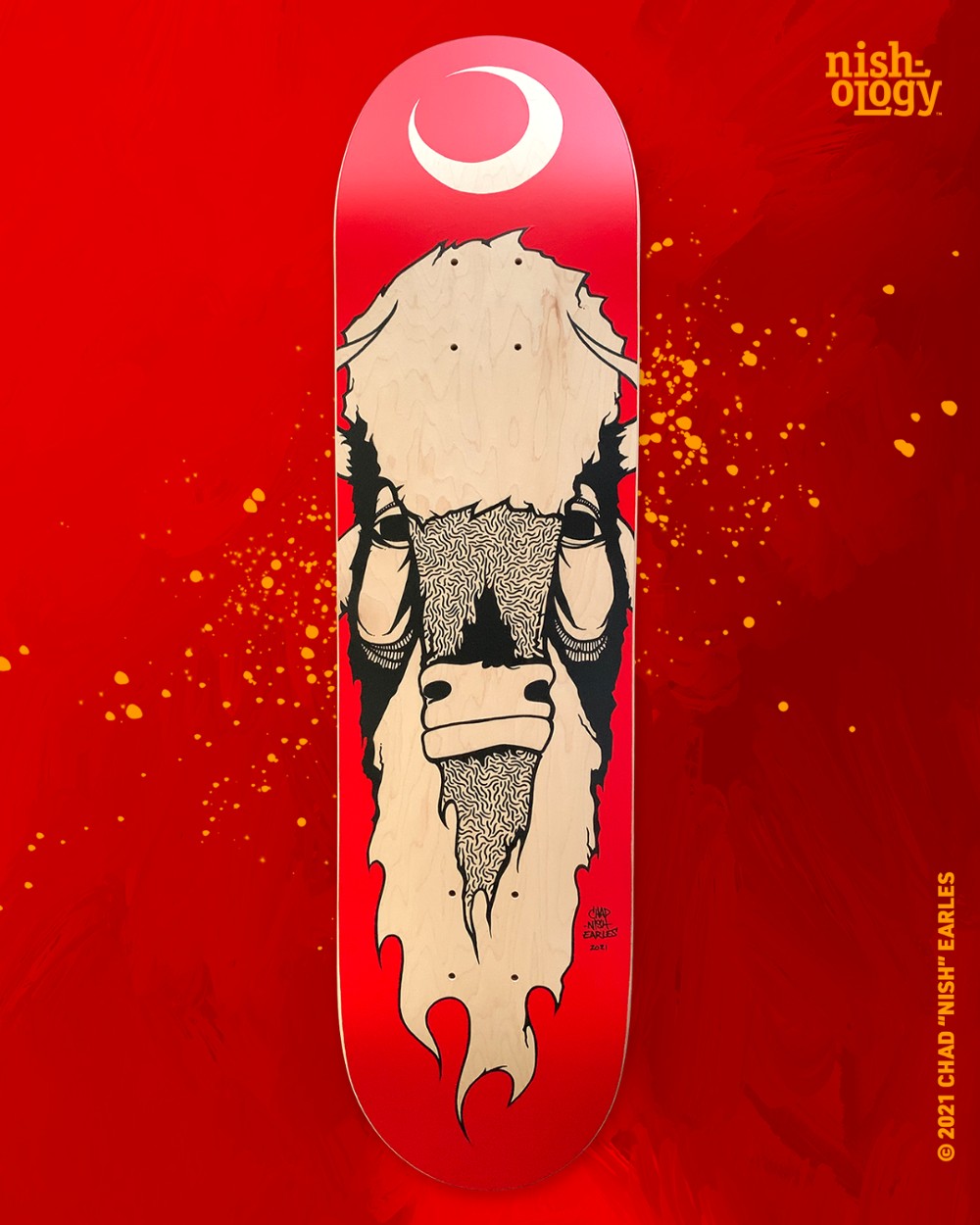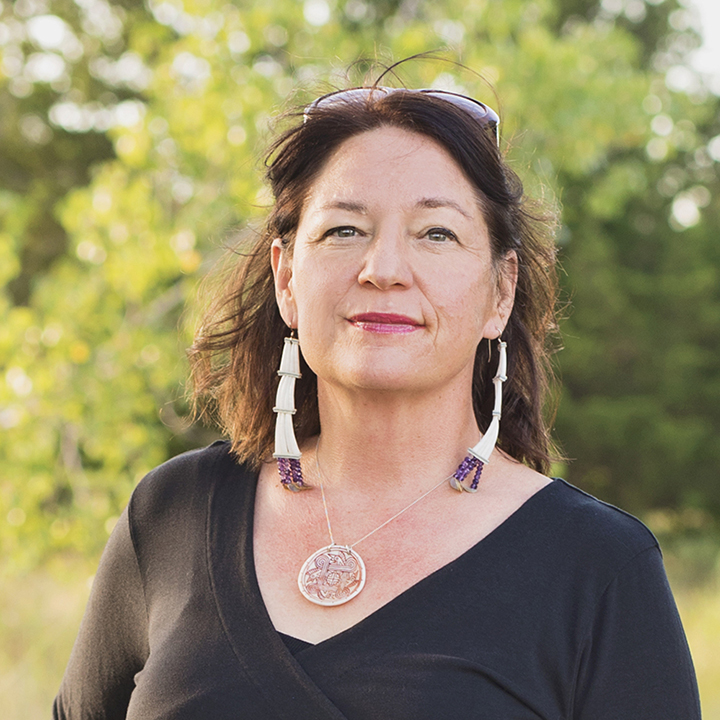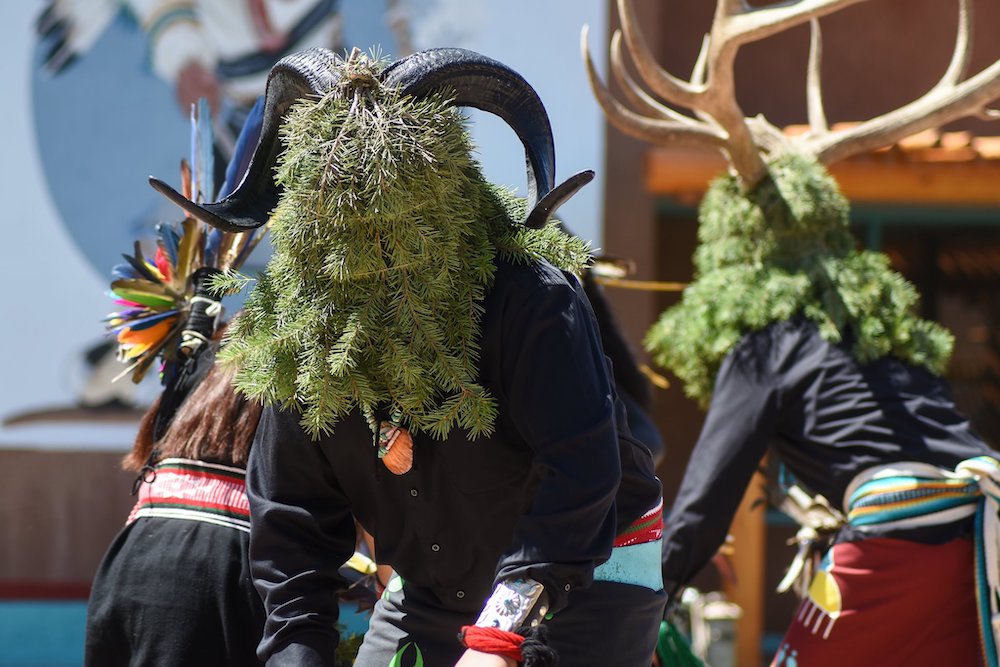
- Details
- By Tamara Ikenberg
This weekend and next week, Indian Country is bustling with art, dance, and documentaries. Highlights include the first Mvskoke Art Market; a special workshop for artists and reporters to learn how to respect the sacred; a weeklong dance and art-filled Southwestern Native celebration; and a powerful documentary looking into the lives of resourceful and resilient Lakota women on South Dakota reservations.
Refer to the Native News Online arts and entertainment guide to make your plans.
Mvskoke Art Market
WHEN: Saturday, April 23 and Sunday, April 24, 10 a.m. to 5 p.m.
WHERE: River Spirit Casino & Resort, 8330 Riverside Pkwy., Tulsa, OK; Event Facebook page
 Bison boards by Caddo artist Chad Earles will be available at the Mvskoke Art Market the weekend of April 23-24 at the River Spirit Casino & Resort in Tulsa, OK. (Photo/Courtesy Chad Earl)The work of Master Mvskoke artist Johnnie Diacon is all over the media and museum worlds.
Bison boards by Caddo artist Chad Earles will be available at the Mvskoke Art Market the weekend of April 23-24 at the River Spirit Casino & Resort in Tulsa, OK. (Photo/Courtesy Chad Earl)The work of Master Mvskoke artist Johnnie Diacon is all over the media and museum worlds.
His paintings of Mvskoke life and culture hang throughout the homes of the characters on FX’s Reservation Dogs, and his massive Trail of Tears mural decorates the Museum of Native American History in Bentonville, Arkansas.
At the moment, Diacon is psyched to be part of the inaugural Mvskoke Art Market, which features the work of 60 artists from all over the country, and is hosted by Muscogee Creek Nation.
“Being Mvskoke and participating in numerous Native art markets produced by both the Cherokee and Chickasaw Nations through the years, I'm really excited to see our people finally getting into hosting and promoting Native art in such a big way,” Diacon told Native News Online. “I hope that this is only the beginning.”
The pieces that Diacon is selling at the show are unmistakably Mvskoke. The painting Dance Leader depicts a limber dancer approaching the arbor under a night sky, and Food Preparers presents a group of Mvskoke women gathered around a table of traditional fare.
The market also includes some more offbeat offerings, like purple and red bison boards by Caddo artist Chad “Nish” Earles.
“The Caddo used to go on buffalo hunts. And buffalo are seen as a really strong animal,” Earles told Native News Online. “With the bison boards, it’s like you're riding a buffalo.”
If you plan to ride this wooden buffalo through the rez, you must add wheels. Earles said most people mount the boards on a wall, but they are fully functional when equipped with wheels.
Earles is a contemporary artist to keep your eye on. He has been involved in a variety of exciting projects lately, including decorating a glass scrim with Caddo pottery designs titled Above and Below, at the Crystal Bridges Museum of Contemporary Art in Bentonville, Arkansas.
Beyond Art: Respecting and Protecting the Sacred
WHEN: Monday, April 25, 4:30 p.m.
WHERE: Event page and registration
 First American Art Magazine editor America Meredith (Cherokee) will moderate the online discussion Beyond Art: Respecting and Protecting the Sacred, on Monday, April 25. (Photo/Courtesy America Meredith)
First American Art Magazine editor America Meredith (Cherokee) will moderate the online discussion Beyond Art: Respecting and Protecting the Sacred, on Monday, April 25. (Photo/Courtesy America Meredith)
When sacred tribal beings and items are exposed to the public, it is a violation of trust and tradition that betrays and corrupts the intrinsic power of the pieces and images.
But not every artist or art industry professional knows what is acceptable and not acceptable for general consumption, and navigating the issue is complex and full of conflicting information.
“Many sacred items are not meant to be photographed or seen by the public, but if you don't know, how do you learn? And when different tribes disagree about protocols, how do we make the best, most represectful choices?” Cherokee artist and First American Magazine editor America Meredith told Native News Online. “As tribes are developing news businesses, their marketing departments create graphics and logos, and some have made missteps. I believe graphic designers, artists, and journalists overwhelmingly want to do the right thing, so it's better to discuss what imagery might be culturally sensitive or taboo beforehand, not just rebuke people after they have made a mistake.”
To help teach artists and art professionals about the importance of protecting the sacred and how to determine what is okay to show, sell, and promote and what is not, Meredith is moderating an online discussion on the topic on Monday. She will be joined by culturally conscious activists, artists and leaders Suzan Shown Harjo (Cheyenne/Hodulgee Muscogee), Richard W. Hill Sr. (Tuscarora Nation at Grand River, Beaver clan,) Tina Kuckkahn (Lac du Flambeau Ojibwe), James Riding In (Pawnee Nation) and Brian Vallo (Pueblo of Acoma).
“This conversation with Indigenous leaders from different tribes and regions is so needed, because the protocols aren't readily available to the public or even to Native American artists who might not have been raised in culturally engaged households,” Meredith said. “As far as I know, there are no books or articles outlining what different tribes say should not be publicly shared. Mainstream Western society doesn't guide us to understand how a sacred image can have its own intrinsic power, so I hope we convey this idea to the audience and also have time for audience questions.”
American Indian Week and Spring Arts Market
WHEN: Monday, April 25 through Sunday, May 1, 9 a.m. to 4 p.m. daily
WHERE: Indian Pueblo Cultural Center, 2401 12th Street NW, Albuquerque, NM; Event page
 The Sky City Buffalo Ram Dancers of Acoma Pueblo will perform during the American Indian Week and Spring Arts Market, taking place Monday, April 25 through Sunday, May 1, at the Indian Pueblo Cultural Center in Albuquerque, NM. (Photo/Courtesy IPCC)
The Sky City Buffalo Ram Dancers of Acoma Pueblo will perform during the American Indian Week and Spring Arts Market, taking place Monday, April 25 through Sunday, May 1, at the Indian Pueblo Cultural Center in Albuquerque, NM. (Photo/Courtesy IPCC)
The Indian Pueblo Cultural Center is hosting seven art and dance-filled days of special events during Native American Indian Week.
The celebration includes an expanded cultural dance schedule and dozens of Native artists selling handcrafted work. During the final weekend, the Spring Arts Market will take over the IPCC’s mural-filled courtyard with 45 artist booths featuring pottery, jewelry, paintings and more. There will also be cultural dance group performances and pottery and painting demonstrations.
Featured regional dance groups performing during Native American Indian Week include The Pueblo Dance Group, Laguna Acoma Pueblo Dancers, Howeya Family Traditional Dance Group, Santa Clara Buffalo Eagle Dance Group, Kallestewa Dance Group, Sky City Buffalo Ram Dancers, The Cellicion Traditional Dancers and the White Mountain Apache Crown Dancers.
During the event, visitors can also pop in to the Indian Pueblo Store to shop cultural treasures, take in the Center’s ongoing immersive exhibits, and indulge in Indigenous cuisine at the Center’s acclaimed restaurant, Indian Pueblo Kitchen.
MMIW/R Artbuild and Special Screening
WHEN: Friday, April 29, 6 p.m. to 10 p.m.
WHERE: Centro Cultural de la Raza, 2004 Park Blvd, San Diego; Event page
 Tatanka SkaWin Swiftbird is a 12-year-old survivor of sexual assault trying to heal her trauma through traditional Lakota ways.
Tatanka SkaWin Swiftbird is a 12-year-old survivor of sexual assault trying to heal her trauma through traditional Lakota ways.
Marie Brush Breaker, 98, is an Indigenous rights activist who has always been a proud Lakota.
Sharon Fool Bull , 62 is a preparer of traditional Lakota ceremonial foods who lost her daughter to a suicide that was never properly investigated.
The voices, experiences and resilience of these generation-spanning Lakota women, and six more women living on the severely impoverished Pine Ridge and Rosebud Indian Reservations in South Dakota are the heart of the documentary Women of the White Buffalo,
The film, produced, directed and written by photographer Deborah Anderson, will have a free screening at an event honoring Missing and Murdered Indigenous Women and Relatives next Friday.
The night’s activities also include a march and an artbuild where participants can create banners and posters drawing attention to MMIW with art supplies provided at the site.
More Stories Like This
Two Indigenous Group Exhibits Opening January 9, 2026 at WatermarkWatermark Art Center to Host “Minwaajimowinan — Good Stories” Exhibition
Museums Alaska Awards More Than $200,000 to 12 Cultural Organizations Statewide
Zuni Youth Enrichment Project Takes Top Emerging Artist Apprentices to Phoenix for Artistic Exploration and Cultural Immersion
From Dishwasher to Award-Winning Chef: Laguna Pueblo's Josh Aragon Serves Up Albuquerque's Best Green Chile Stew
Help us defend tribal sovereignty.
At Native News Online, our mission is rooted in telling the stories that strengthen sovereignty and uplift Indigenous voices — not just at year’s end, but every single day.
Because of your generosity last year, we were able to keep our reporters on the ground in tribal communities, at national gatherings and in the halls of Congress — covering the issues that matter most to Indian Country: sovereignty, culture, education, health and economic opportunity.
That support sustained us through a tough year in 2025. Now, as we look to the year ahead, we need your help right now to ensure warrior journalism remains strong — reporting that defends tribal sovereignty, amplifies Native truth, and holds power accountable.
 The stakes couldn't be higher. Your support keeps Native voices heard, Native stories told and Native sovereignty defended.
The stakes couldn't be higher. Your support keeps Native voices heard, Native stories told and Native sovereignty defended.
Stand with Warrior Journalism today.
Levi Rickert (Potawatomi), Editor & Publisher

